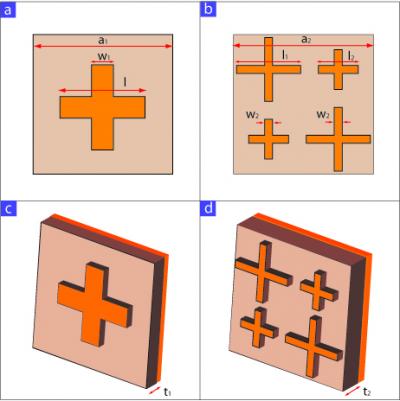A research team from Boston College has reported in the latest edition of Physical Review Letters that a man-made metamaterial can address blackbody radiation emission with an effectiveness exceeding natural limits.
The research team was headed by a physicist named Willie Padilla. A blackbody object is a material that completely absorbs the radiation incident on it and also releases energy depending on the temperature of the material. The blackbody law sates that the amount of absorbed energy is equal to the amount of emitted energy in equilibrium.
 A designer metamaterial has shown it can engineer emitted "blackbody" radiation with an efficiency beyond the natural limits imposed by the material’s temperature, a team of researchers report in Physical Review Letters. Illustration shows design of the infrared metamaterial absorber. (a) Top view of a single band metamaterial absorber unit cell. (b) Schematic of a dual-band metamaterial absorber. (c & d) Perspective view for single and dual-band metamaterial absorbers.
A designer metamaterial has shown it can engineer emitted "blackbody" radiation with an efficiency beyond the natural limits imposed by the material’s temperature, a team of researchers report in Physical Review Letters. Illustration shows design of the infrared metamaterial absorber. (a) Top view of a single band metamaterial absorber unit cell. (b) Schematic of a dual-band metamaterial absorber. (c & d) Perspective view for single and dual-band metamaterial absorbers.
This advancement made by Padilla, Duke University, and SensorMetrixcan can result in new technologies that can be utilized to collect energy from unwanted heat resulting from several industrial processes. Besides, the designer metamaterial can control emissivity, thereby improving the efficiency of energy conversion.
Metamaterials developed from artificial compounds are designed in such a way as to impart unique properties that enhance their performance and enable them to develop good response to blackbody radiation. These materials demonstrate negative index of refraction and are integrated with artificial optical devices to exhibit an effect known as an invisibility cloak. Invisibility cloak effect may be defined as the phenomenon of focusing light around a specific region and then masking its existence.
Researchers have been searching for a suitable blackbody material that can be utilized in generating thermoelectric or solar energy. Before three years, the team produced an ideal metamaterial absorber that had the ability to absorb the entire light incident on it. To this the researches applied Kirchoffs's law of thermal radiation which states that a material’s ability to absorb radiation is the same as its ability to emit radiation. In the mid-infrared range, 98 % of emissivity was achieved by the thermal emitter. A dual-band emitter demonstrated emissivity of 85 % and 89 %.
The researchers stated that changing of metamaterial composition can lead to development of single-band, dual-band and broadband metamaterials. These enable better control over emitted photons so as to increase the efficiency of energy conversion.